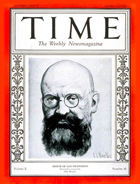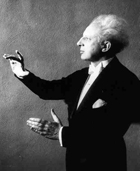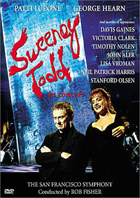
Odds 'n' Ends of the SF Symphony Discography
We now reach the sixth of a series of articles devoted to the San Francisco Symphony's long discography. (I had absolutely no idea, when I began, that this project would balloon to its present size, by the way — but I'm really quite pleased that it has.) The story so far:
- Pierre Monteux's many RCA Victor recordings in the 1940s and early 1950s then leaping ahead to:
- The backstory to Herbert Blomstedt's Decca recordings from the 1980s and early 1990s followed by:
- The Blomstedt recordings after which we reverse time back to:
- The "transition" years of Enrique Jordá and Josef Krips (1950s and 60s), when the river of recordings evaporated.
- Seiji Ozawa and Edo De Waart (1969 through 1985, the re-awakening of the SFS discography
Let's begin with a correction. An alert and generous reader pointed out to me that the Ameling/De Waart performances of Debussy, Ravel, and Duparc are not actually out of print, despite my having said so in the previous post in this series. They can be obtained on the Eloquence Australia label, coupled with the Berlioz Les nuits d'éte performed by Hildegard Behrens and the Vienna Symphony under Francis Travis. You do need to shop Australian to get it, though.
On to the odds 'n' ends category, those conductors who have either left us only a few recordings with the SFS, or else whose recordings have slipped into the twilight zone of the nearly-forgotten. Therefore:
 There's no justice in this world. If there were, Alfred Hertz's SFS recordings from the 1920s would be available in a meticulously remastered and lavishly annotated multi-disc album, possibly presented with pride by the San Francisco Symphony itself. Instead, they mostly languish in audio-incunabula status, never transferred to LPs, much less lovingly digitized/remastered as they so richly deserve.
There's no justice in this world. If there were, Alfred Hertz's SFS recordings from the 1920s would be available in a meticulously remastered and lavishly annotated multi-disc album, possibly presented with pride by the San Francisco Symphony itself. Instead, they mostly languish in audio-incunabula status, never transferred to LPs, much less lovingly digitized/remastered as they so richly deserve.
Alfred Hertz ranks right up there with Monteux in terms of establishing the SFS on the national scene. When he arrived in San Francisco in 1915 he faced not so much an orchestra as a dying swan. Audience enthusiasm had dwindled precipitously after the initial excitement of the first season in 1911, funding was drying up, and the players themselves were a grumpy lot. (The Time cover to the right reports on his appointment.)
But dynamo Hertz, a magnificent orchestra builder and music evangelist, got the swan soaring as never before. Although Henry Hadley is credited as the first official conductor of the SFS, it was Alfred Hertz who made it a lasting institution instead of a short-lived civic experiment.
Hertz initiated the SFS discography with an impressive series of 78s made by RCA Victor from 1925 to his retirement in 1930. RCA had built a recording studio on 78th Street in Oakland, and it was there that Hertz and the SFS laid down eighteen separate albums, in repertoire ranging from Beethoven (Leonore Overture No. 3), through a fair amount of Wagner, and even near-contemporary material such as works by Fritz Kreisler.
But you can't buy them; hell, you can't even find them.
Critic Robert Commanday shares my dismay, writing some years ago: "The wonderful recordings and broadcasts made under Pierre Monteux' direction, even the old 78s conducted by Alfred Hertz cry out for re-issuing, but the Symphony's spokesperson said only that the question of the association producing its own records does come up for consideration. That's consistent with the diffident attitude towards its past taken by this extraordinarily well-financed and secure public institution." (You can find the entire article in San Francisco Classical Voice for January 23, 2001.)
So Hertz's records are scarce as hen's teeth, mostly in the hands of collectors (the records, I mean, not the teeth). I have access to a grand total of two selections: the Prelude and Good Friday Spell from Parsifal, constituting the second-earliest album recorded (1925, still acoustic), and the first one released.
What's clear is that the SFS under Hertz was an excellent group of its day, very much a Romantic ensemble with what sounds to be exceptionally lustrous strings — at least as far as you can tell given the severe frequency limitations of acoustic recording, never at more disadvantage than in orchestral literature. Lots of slippy-slidey fiddle playing (even shared a bit by the horns), very much par for the era. The Parsifal performances offer a special historical energy, given that Hertz was the conductor of the American premiere.
If any folks amongst the readership have any tips as to tracking down the Hertz/SFS recordings in legal, post-78 formats, well...there's an "Add Comment" link down at the bottom of the article.
 Leopold Stokowski (to the right) conducted the SFS in two recordings from the 1950s. A "highlights" album from Mussorgsky's "Boris Godunov" is very much in print on CD, and available here, coupled with some selections from Parsifal with the "Leopold Stokowski Orchestra". This is vintage Stokie — lush, curvy, big-boned and big-bodied, right on the edge of overdone but (at least to my ears) never quite slopping over.
Leopold Stokowski (to the right) conducted the SFS in two recordings from the 1950s. A "highlights" album from Mussorgsky's "Boris Godunov" is very much in print on CD, and available here, coupled with some selections from Parsifal with the "Leopold Stokowski Orchestra". This is vintage Stokie — lush, curvy, big-boned and big-bodied, right on the edge of overdone but (at least to my ears) never quite slopping over.
The second Stokowski/SFS selection is a tough one to track down, never released on CD to the best of my knowledge. This is Morton Gould's "Dance Variations" with duo-pianists Arthur Wittemore and Jack Lowe. Because Mitropoulos and the NY Phil recorded the same work with the same pianists the same year (1953), the SFS version evaporated from the catalog. I tracked down a copy (RCA Victor LM 1858) and find it to be very similar to the NY Phil rendition (included in "An American Celebration, Volume 2" available from the Philharmonic) albeit a bit spunkier overall.
Perhaps this is the best place to address the question of San Francisco Opera recordings; until 1980 the Opera Orchestra was a subset of the Symphony. So even if they aren't listed as such, pre-1980 SF Opera recordings are also the San Francisco Symphony after a fashion. These recordings aren't listed officially in the Symphony's published discography, because officially the San Francisco Opera Orchestra was a different ensemble.
But were you to listen to, say, this historical overview of SF Opera recordings, you are hearing the same orchestra players as the Monteux/SFS recordings. This L'Africaine, by Meyerbeer, is accompanied by Ozawa's SFS; this Adriana Lecouvreur, or Norma, De Waart's. Therefore this Aida presents us with another Jordá-era document, and these excerpts from L'Elisir d'Amore offer a commercially-available peek at Krips's SFS. You are also hearing the sort-of SFS in Flagstad's San Francisco recordings, with conductors such as Gaetano Merola or Fritz Reiner.
So I'll leave it for you to decide if the pre-1980 San Francisco Opera recordings belong in the SFS discography. The Symphony doesn't think so, but that doesn't mean you have to accept their verdict.
During the years of the composer-in-residence program, John Adams conducted "Harmonium" (premiered by De Waart) on this album, which contains other Adams works with Kent Nagano conducting the Lyon Opera Orchestra. The same performance can be found on the "John Adams Earbox" album. I wish John had conducted more with the SFS; I was in the Conservatory's New Music Ensemble during his days on the faculty, and I can attest to his fine technique.
Another composer-in-residence, Charles Wuorinen, shared conducting duties with Herbert Blomstedt for On Alligators.
There is a sweet coming-home feel to Alasdair Neale's recording of Aaron Jay Kernis's Colored Field, once again available as an ArkivCD. Aaron is at least partly a San Francisco boy, having studied at the San Francisco Conservatory, where Alasdair is one of the orchestra conductors — and where Aaron was my piano student. Also on the album is his Still Movement With Hymn, with Pamela Frank, Paul Neubauer, Carter Brey (a dear friend from our mutual salad days at Peabody), and Christopher O'Reilly.
 The Symphony's encouragment of current composers continues. The latest addition to the SF Symphony discography is an utterly spellbinding disc of two works by Chickasaw Nation citizen Jerod Impichchaachaaha' Tate, Tracing Mississippi, and Iholba'. The conductor is Edwin Outwater, on his way to the Kitchener Waterloo Symphony in Ontario after having completed his gig as Resident Conductor of the SFS.
The Symphony's encouragment of current composers continues. The latest addition to the SF Symphony discography is an utterly spellbinding disc of two works by Chickasaw Nation citizen Jerod Impichchaachaaha' Tate, Tracing Mississippi, and Iholba'. The conductor is Edwin Outwater, on his way to the Kitchener Waterloo Symphony in Ontario after having completed his gig as Resident Conductor of the SFS.
Rob Fisher headed the band for a sizzling quasi-staged 2001 concert version of Sondheim's Sweeney Todd, preserved for posterity on DVD. That was one evening at the Symphony I won't soon forget, and thanks to this DVD, I can relive it as I wish.
I am limiting my coverage to recordings by the orchestra proper, but you can also find CDs from individual orchestra members, as well as recordings by the San Francisco Symphony Chorus and the San Francisco Youth Orchestra, all worthy additions to anybody's collection.
And I mustn't forget Michael Kamen's disc with Metallica, although all in all I'd rather like to.
Whew.
Coming up: the Grammy-fest of the MTT years, then a final valedictory article looking at some personal favorites from the 80-year span of the SFS discography. The new concert seasons are rapidly approaching, and it will soon be time to start outlining the musical delights in store for 2008-2009 here in San Francisco and the Bay Area.
